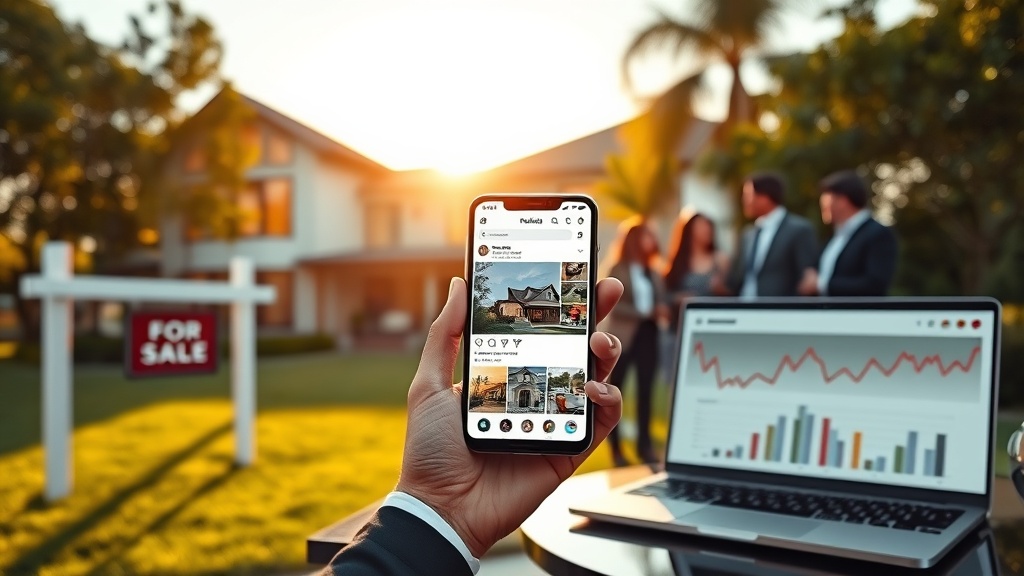The Top Social Media Platforms for Real Estate Marketing: Pros and Cons

" "
In the ever-evolving landscape of real estate marketing, social media has emerged as a powerful tool to connect with potential buyers and sellers. With millions of users across various platforms, real estate professionals have the opportunity to showcase properties, build their brand, and engage with audiences like never before. However, not all social media platforms are created equal, and each comes with its own set of advantages and disadvantages. In this comprehensive guide, we’ll explore the top three social media platforms for real estate marketing: Facebook, Instagram, and LinkedIn. We'll delve into their pros and cons, offering real-world scenarios and insights to help you make informed decisions.
Historical Context
Before diving into the specifics, it's essential to understand how social media became a cornerstone of real estate marketing. In the early 2000s, the internet began to transform the real estate industry. Websites like Zillow and Realtor.com made property listings accessible to the masses, shifting the power dynamics from realtors being gatekeepers of information to consumers having access at their fingertips.
With the advent of social media in the mid-2000s, platforms like Facebook and LinkedIn initially served as networking tools, but soon real estate professionals recognized their potential for marketing. Instagram, which launched in 2010, brought a new dimension with its visual-centric approach, catering perfectly to the real estate sector's needs.
Current Trends
Today, social media is not just an option but a necessity for real estate marketing. Virtual tours, live videos, and engaging content have become standard practices. Moreover, the rise of mobile usage and the integration of AI-driven analytics have further enhanced targeted advertising, making social media a more potent tool than ever.
Facebook: The All-Rounder
Pros:
Wide Audience Reach: With over 2.8 billion monthly active users, Facebook remains a powerhouse for reaching a diverse audience. Whether you're targeting first-time homebuyers or seasoned investors, Facebook's extensive user base allows for targeted and segmented marketing strategies.
Robust Advertising Tools: Facebook's advertising platform is arguably one of the most sophisticated, offering detailed targeting options based on demographics, interests, and behaviors. This allows real estate agents to create highly customizable ad campaigns that reach the right audience.
Community Building: Facebook Groups provide an excellent platform for building communities around specific real estate markets or neighborhoods. Agents can engage with potential clients, share insights, and establish trust through regular interaction.
Integrated Messenger: Facebook Messenger facilitates direct communication with potential clients, making it easier to schedule showings, answer inquiries, and build relationships.
Cons:
Decreasing Organic Reach: Over the years, Facebook's algorithm has shifted, making it harder for business pages to achieve significant organic reach without paid promotions. This means real estate agents often have to invest in advertising to ensure visibility.
Privacy Concerns: With increasing scrutiny over data privacy, users are more cautious about sharing personal information. This can affect how much data is available for targeting ads.
Content Saturation: With so many businesses vying for attention, standing out on Facebook requires creative and engaging content, which can be resource-intensive.
Real-World Scenario:
Consider a real estate agent in Los Angeles looking to market luxury properties. By leveraging Facebook's advertising tools, they can specifically target users in high-income brackets, those interested in luxury goods, and individuals who have recently searched for real estate-related content. Additionally, they can create a Facebook Group dedicated to luxury real estate in LA, fostering a community of potential buyers and industry professionals.
Instagram: The Visual Powerhouse
Pros:
Visual Appeal: Instagram's visual-centric platform is ideal for showcasing stunning property photos and videos. High-quality imagery can captivate potential buyers and create an emotional connection.
Instagram Stories and Reels: These features allow agents to share behind-the-scenes content, virtual tours, and quick property highlights, making the experience more personal and engaging.
Young Audience: Instagram's user base skews younger, making it perfect for targeting millennials and Gen Z, who are increasingly entering the housing market.
Influencer Collaboration: Partnering with local influencers can extend reach and credibility, especially when targeting niche markets.
Cons:
Algorithm Changes: Like Facebook, Instagram's algorithm can be unpredictable, affecting the visibility of posts. This necessitates a consistent and strategic posting schedule.
Limited Link Sharing: Instagram does not allow clickable links in posts, which can make it challenging to drive traffic to property listings directly. However, this can be mitigated by utilizing the link in bio feature or through Instagram Stories.
Time-Intensive: Maintaining an engaging and visually appealing Instagram account requires significant time and effort, from creating content to engaging with followers.
Real-World Scenario:
A New York City-based real estate agent focuses on urban lofts and apartments. By curating a visually stunning Instagram feed featuring high-quality photos and videos, they attract young professionals and creatives looking for unique living spaces. Through Instagram Stories, the agent shares daily updates on new listings and behind-the-scenes looks at property showings, fostering a sense of exclusivity and immediacy.
LinkedIn: The Professional Network
Pros:
Professional Audience: LinkedIn is the go-to platform for B2B interactions, making it ideal for real estate professionals looking to connect with other industry professionals, investors, and corporate clients.
Thought Leadership: By sharing industry insights, market analyses, and trend forecasts, real estate agents can establish themselves as thought leaders, enhancing their credibility and trustworthiness.
Networking Opportunities: LinkedIn offers numerous opportunities to network with potential clients, partners, and influencers within the real estate industry.
LinkedIn Groups: Joining and participating in real estate-related groups allows agents to engage with like-minded professionals and potential clients.
Cons:
Limited Visual Appeal: Compared to Instagram and Facebook, LinkedIn's focus is more on text-based content, which can be a limitation for showcasing properties.
Niche Audience: LinkedIn's user base is more niche, primarily consisting of professionals and companies. This can be a con if the target market is broader or more consumer-focused.
Less Engagement: While LinkedIn is excellent for professional networking, user engagement levels can be lower compared to more socially-driven platforms.
Real-World Scenario:
A commercial real estate agent in Chicago uses LinkedIn to connect with corporate clients looking for office spaces. By sharing detailed market reports and industry trends, the agent positions themselves as an expert in commercial real estate. They participate in and contribute to LinkedIn Groups focused on commercial property investment, expanding their network and attracting potential clients.
Future Implications
The future of social media in real estate marketing promises exciting developments:
AI and Machine Learning: These technologies will further refine targeting capabilities, allowing for even more personalized and effective marketing strategies.
Augmented Reality (AR): Platforms may soon incorporate AR features, enabling virtual property tours and interactive experiences for users.
Integration with IoT: As smart homes become more prevalent, social media platforms might integrate IoT data, offering consumers a more comprehensive view of potential properties.
Conclusion
In conclusion, the choice of social media platforms for real estate marketing depends on your target audience, goals, and resources. Facebook offers versatility and a broad reach, making it a staple for most real estate professionals. Instagram stands out for its visual storytelling capabilities, ideal for showcasing properties in an engaging manner. LinkedIn, on the other hand, excels in professional networking and thought leadership, crucial for commercial real estate and B2B interactions.
By understanding the pros and cons of each platform and tailoring your strategies accordingly, you can maximize your reach, engage with your audience effectively, and ultimately drive more sales. As the digital landscape continues to evolve, staying informed and adaptable will be key to success in real estate marketing.











